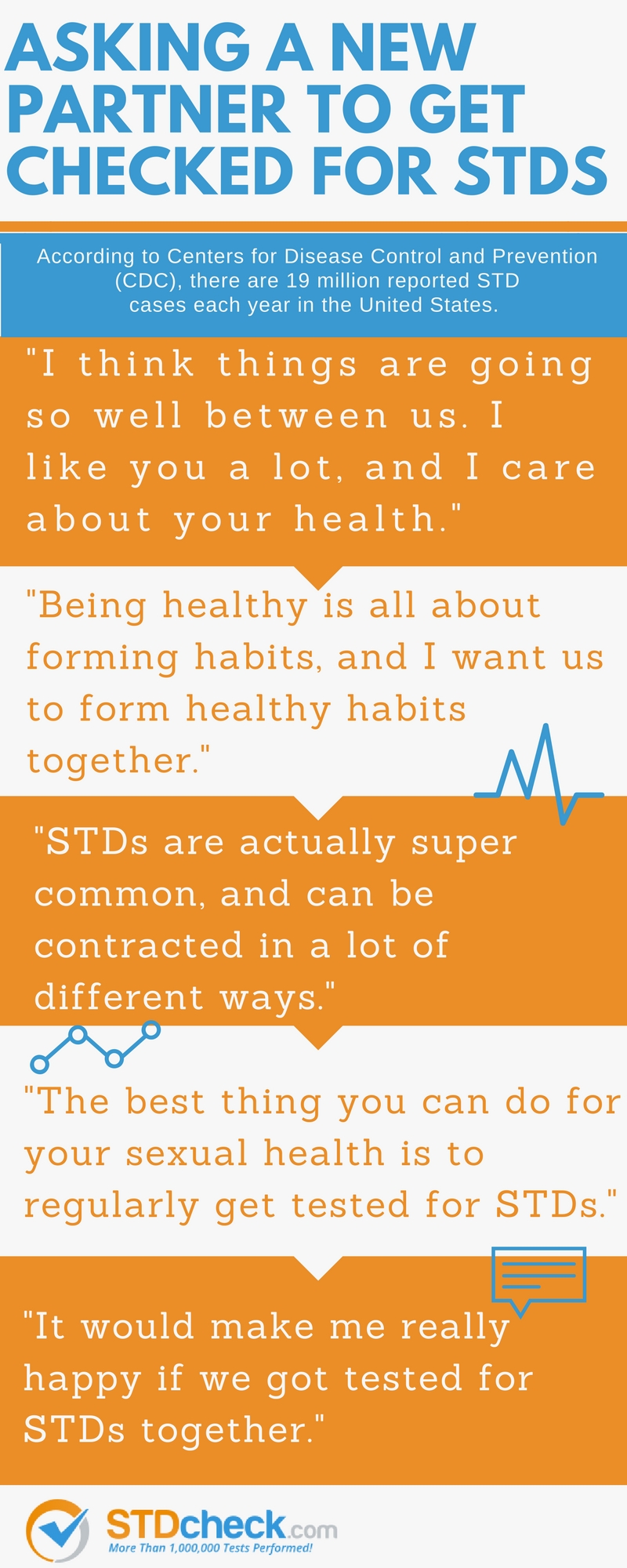How to Talk to a New Partner about STD Testing, Without Being Awkward
So you’ve got a new boo; time to talk to them about sexual health.
Spring is in the air! Birds are singing, flowers are blooming, and couples are freaking coupling. This time of year is full of new love, relationships, and mounds of pollen. No matter what season of the year, if you’re beginning a new relationship, it’s always the right time to talk about getting tested for STDs.

Have you ever talked to a new partner about STD testing? You don’t have to answer! This can be an uncomfortable conversation, but it doesn’t have to be, and it’s SO WORTH IT.
Maybe you’ve been out of the game for a while and you’re beginning to dip your toe back in the dating pool, or you’re super experienced and you’ve found a total dreamboat that you’re planning to keep around, or you’re anywhere beyond or between. Whatever your case may be, we are here to talk about sex; or rather, we’re here to talk about talking about sex.
If your google search has brought you here, perhaps you or someone you know has had an unfortunate encounter with STDs in the past, or it could be that you just really want to prioritize your sexual health and be safe. Which is great! Everyone should be concerned about STDs, as they can come from a multitude of sources (not just sexual). If you choose to talk about it early on, it can be amazing for your relationship. But if you’re having a little trouble, we’ve got a few guidelines to help you when you decide to talk to your new partner about getting checked for STDs.

By no means should anyone feel like these are set in stone rules for having the conversation—because guess what? Every single relationship is different!
You don’t need to worry about fitting into a specific mold, or making it look like the people on TV do.

New relationships are hard, and everyone is different. Just be yourself, and if this person really cares about you, they’ll stick around!
That being said, there are certain parameters for you to stay within that could help the conversation be a positive experience for you both.
“But Why?”
Yes, this can be a tough conversation, so why have it?
The two biggest reasons why you should always talk to a new partner about STD testing:
- You both benefit from the harmony that comes from being concerned about each other’s health.
- You both benefit from the intimacy that comes from open and honest communication in an uncomfortable situation.
—in that exact order.
Health
The Centers for Disease Control and Prevention (CDC) estimates there are 19 million reported STD cases each year in the United States. It is very common for STDs to go unreported or untested because many of the symptoms are asymptomatic, as in “silent” symptoms.
There are several different types of STDs that you can develop:
Chlamydia has almost no identifiable symptoms, causing it to often go untreated. There are approximately 2.86 million chlamydia infections reported annually, making it the most frequently reported bacterial STD in the United States.
Gonorrhea does not always show symptoms, but when it does, it often includes unusual discharge, painful urination, and sometimes vomiting. According to the CDC, there are an estimated 820,000 U.S. cases of gonorrhea annually.
Hepatitis A symptoms are often mild or not apparent, and a person can transmit the virus up to two weeks before the symptoms appear at all.

It is important to get tested for Hepatitis A after coming back from a trip out of the U.S., where the disease is more prevalent.
Hepatitis B can show almost no symptoms in the first 6 months of contraction. If the disease goes untreated for longer than 6 months, it can cause lifelong health problems. As of 2009, the Centers for Disease Control and Prevention (CDC) estimated 800,000 to 1.4 million cases of chronic hepatitis B in the United States.
Hepatitis C also will often show almost no symptoms during the first 6 months. After six months of infection, hepatitis C progresses to the chronic stage (known as chronic hepatitis C) and becomes a serious disease that can lead to liver failure, liver cancer, and death. The CDC estimates that 2.7 million Americans have chronic hepatitis C.
Oral Herpes doesn’t always show symptoms but can include fever blisters, cold sores, or itching/burning around the mouth. According to John Hopkins School of Medicine, 50 to 80 percent of adults in the U.S. are affected by herpes.
Secure and Confidential
STD testing services
The fastest results possbile - available in 1 to 2 days
HIV destroys cells in your immune system so it, unfortunately, looks like a number of other disease symptoms. It is possible to have HIV for even decades without developing any signs at all. According to the CDC, about 1.2 million Americans live with HIV and approximately 250,000 people are currently undiagnosed and unknowingly living with HIV.
Syphilis is sometimes referred to as “the great imitator” because the symptoms are almost completely indistinguishable from other diseases. According to the CDC, there are an estimated 55,000 new syphilis infections contracted annually.

Moral of the story: STDs are way more common than we would like to believe, and are often completely undetectable without an STD test! Many of the STDs listed do not necessarily have anything to do with your sexual history. STDs can be transmitted from exposure to harmful bacteria to a baby during birth, from ingesting infected food or drinks, sharing razors or toothbrushes, coming into contact with another person’s open wound, or even from mosquito bites. Just because you want to talk about getting checked for STDs, does not necessarily mean that you are assuming a particular type of behavior from your partner’s past.
To read more about non-sexual ways that you or your new partner could have contracted an STD, check out our blog on 9 Ways You Can Get an STD Without Having Sex.
Communication
If you’re about to skim this section, here’s the bottom line: Talking is intimate as heck. That’s all there is to it. If you begin your relationship by bringing up any fears or concerns you may have (in a proactive way), you are going to have a strong foundation built on open communication and trust! Duh!
Do you remember in kindergarten when there was a disagreement on the playground, and your teacher would make you sit down and talk about your feelings? Talking about your thoughts and feelings can be just as (if not more) important in adult relationships.
When you consent to have sex, you’re ultimately putting yourself in a vulnerable position, so it’s completely fair for you to want your partner to have a vulnerable conversation with you, about the last time they were checked for STDs, and their results.
As we’ve already mentioned, talking about your sexual past at the beginning of any relationship can be extremely difficult to navigate. Your new relationship is delicate, and you may not be out of the “honeymoon” phase yet. You may still want to pretend that your future is nothing but rainbows, sunsets, and unicorns, which are all very exciting to talk about. However, skipping the STD talk can threaten your health, fertility, and life.
Getting into a nitty-gritty conversation so early may not seem fun, but it’s also not fun to accidentally give or receive an STD. Communication is the foundation of any relationship, and by being responsible and asking each other to get tested, you are laying the groundwork for a bright and healthy future!

This is going to be a hard pill to swallow, but sex does not have to be spontaneous. The movies often portray a couple of very attractive people, engaging in some unrelated, quick and witty banter, and then cut to five seconds later when they’re in bed, hot n’ heavy. This does not have to be the case!
Some people expect for things to move very quickly, while others prefer to hit the brakes and take things slow. When it comes to cozying up with a new partner, it’s more than okay (in fact it’s encouraged) to weigh all of the factors before making a decision. This involves taking the time to talk about their STD status and determine what methods of protection you’re both comfortable with.

Not only is open communication good for your emotional well being, but in the long term, it will help your sexual relationship! Having honest and open talks about your sexual health can help you and your partner be more relaxed, especially when talking about your needs in the bedroom.
So talking about the tough stuff now will ultimately bring you closer to your significant other, and you’ll be able to handle anything else that comes along (like when you bring them home for Thanksgiving and your aunt is super offensive.)
#BreakTheHoneyMoonPhase
“But How?”
Okay, you’re convinced: You need to have the talk. Now, what’s the best way to go about it?
1) Define your parameters.

Consider ahead of time what bases you want to touch. Sexual health can include a very broad range of topics: Do you just want to find out the last time they were tested for STDs? Or would you prefer to delve deeper into their sexual history? If either of you become emotional or defensive during this conversation, it could be easy to end up flying off the rails and over into the land of no return (i.e. the opposite of where you want to be).
Here are a few questions that you can ask to help keep the two of you on track:
-
- When was the last time that you were checked for STDs?
-
- What STDs were checked for?
- Do you know if you’ve ever been with someone who may have STDs?
Some of these questions are more neutral than others. It’s important to decide ahead of time how far into detail you want to delve. Long before your conversation begins, you should determine how much you personally are willing to divulge about your past. You should begin the conversation by answering some of these tough questions yourself, to establish trust and vulnerability.
Your goal in this conversation could be to encourage your partner to get an STD check with you. Getting an STD check together may not sound romantic, but it comes across as the least accusatory option.You could easily go to STDcheck.com together, make an appointment at a lab near you, and split the cost however you deem fit. Do not try to sexualize the thought of getting an STD check together, but do consider trying to make it into a fun couples activity: For example, treat yourselves to some ice cream or a movie afterward! Show your partner that getting tested doesn’t have to be awkward; it can be fun!
An STDcheck date may not be right for your relationship, but whatever you decide to do, make sure to have a clear goal in mind when going into the conversation.
2. Choose your time and location.

There’s no way to emphasize this enough: THE IDEAL TIME IS NOT IN BED WITH YOUR CLOTHES OFF.
Talking about getting checked for STDs is difficult enough. This is not a question to ask right before sex when you are both ready to bare it all.
Preferably, try and plan some time, maybe a day or two in advance when you’re both free to talk in a private and safe environment. Make sure you are both sitting down and comfortable. Remind yourself that you deserve someone that is going to be willing to have this conversation. If they care about you, it will not be a problem.
3) Set the tone.

Keep the tone light and pleasant, but do not try to spice it up. Do not under any circumstances be afraid of killing the mood. In fact, just decide now that you are going to kill the mood. There: It’s Dead. Gone.
It’s important that your partner does not feel attacked. Maybe have their favorite snack waiting for them or begin with a compliment, and don’t be afraid to smile!
Start the conversation by telling them how happy you are with them, and how much you care about them. You should stress that you feel like things are going really well, and you want the both of you to care about each other’s health. You can explain that health is all about forming good habits, and you want to form good habits together as a couple. You know that the best thing you can do for your sexual health is to regularly get tested for STDs; try and normalize this idea by telling them how common and easy it is to get tested.
4) Share some of your personal experiences and data.

If you have tested for STDs before, let them know! Allow yourself to be a source of information. Talk about what your experience was and how much better it is to be informed about your sexual health. Normalize the experience.
If you or someone you know has been in a situation that caused you to consider getting an STD check, let your new partner know that it has nothing to do with them, but that you’ve just witnessed some close calls in the past.
It’s important to share your reasoning on why this is a concern for you. Reference the health and communication benefits that having this conversation could facilitate. Having a conversation about STD testing early will prove that you and your partner can openly communicate about a number of other thorny topics.
Share any data that stuck with you in your research; it’s perfectly fine to even share this blog post with your new partner (hi, new partner!).
5) Share your expectations!

Okay, so your conversation about getting tested for STDs was a breeze! Your partner was super understanding and onboard. After such a wonderful and productive conversation, you probably think they’re perfect right now, but the conversation isn’t over yet and they’re not a mind reader. Tell them specifically what you want to come from the conversation.
Tell them that maybe you want to get checked together! STDs can take months to show up in a test, so even if you’ve both been recently tested, it’s never too soon to get tested again.
If this is a new experience for the both of you, talk about how great it would be to take this on together. Visit STDcheck.com and browse tests and prices, then all you have to do is choose a lab near you, no appointment necessary. STDcheck.com is fast, private and affordable!
You Are Ready
Talking about STDs with your new partner does not have to be super awkward. Just because you are with someone new, does not mean that you should throw good communication practices and healthy habits out the window! Asking your partner about getting an STD check will be a breeze with these 5 simple steps that will set you up for success. Remember: Define your parameters, choose your time and location ahead of time, set the tone with a positive atmosphere, share a personal experience and your expectations.

Are you and your partner thinking about getting tested together? Check out our tests and prices here.
Medically Reviewed by Colleen Ryan, MD on November 13, 2023
Secure and Confidential
STD testing services
The fastest results possbile - available in 1 to 2 days

Tagged
Categorized As
Author: Lauralei Like
Lauralei graduated from SHSU in 2017 with a B.A. in Mass Communication: Public Relations and Advertising. Mass Communication is the perfect term for what she loves to do: Communicate to the masses the importance of destigmatization and promoting an honest conversation surrounding sexual health. Before Lauralei joined STDcheck.com, she worked for a branding and marketing agency, but she longed to work with a company that was committed to creating a meaningful sense of community and making the world a better place; STDcheck.com turned out to be the perfect fit. Lauralei is the official STDcheck.com relationship expert and pun-master. She believes that it is her sworn duty to provide the internet with reliable, well-researched, and probably funny information when it comes to whatever she is writing about. Her writing has been featured in numerous publications, including Bustle, The Epoch Times, Romper, MedTraveler, and Healthable. When Lauralei isn’t writing, she’s playing with her pet bunnies, sewing dresses, or searching for the best new brunch spot.




